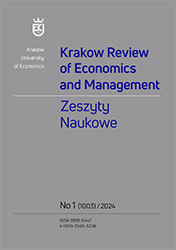Multigenerational Teams from the Perspective of Knowledge Management Based on the Example of a Selected Public University
DOI:
https://doi.org/10.15678/KREM.2024.1003.0103Słowa kluczowe:
multigenerational team, knowledge management, Baby Boomers, Generation X, Generation Y, Generation ZAbstrakt
Objective: The purpose of the article is to answer the following questions: What are the problems faced by university managers responsible for managing multigenerational work teams? Is it possible, and if so, what are good practices in integrating the potential of multigenerational teams of employees? What is the overall assessment of multigenerational teams – do university executives see them as an opportunity or a burden?
Research Design & Methods: Qualitative research in the form of a case study was carried out. This method included seven individual interviews with executives at the Faculty of Organization and Management at Lodz University of Technology.
Findings: Executives at the selected university identify various types of problems in managing multigenerational teams, while recognising opportunities to integrate the potential inherent in age-diverse teams. Respondents are mostly positive about intergenerational teams, but they also note some difficulties for managers related to having a multigenerational team.
Implications / Recommendations: The role of people responsible for leading multigenerational teams is becoming increasingly demanding. Striving to achieve equal involvement of representatives of all generations in the work is one of the most difficult challenges faced by university managers today. The effort, however, is worth making, as any diversity can positively influence the team and foster improvements in knowledge management.
Contribution: The article adds to the characterisation of each generation of employees with aspects from a knowledge management perspective.
Pobrania
Bibliografia
Boguski, J. (2013). Zarządzanie wiedzą w uczelni wyższej. Nauka i Szkolnictwo Wyższe, 2(42).
Corbin, J., & Strauss, A. L. (2008). Basics of Qualitative Research: Techniques and Procedures for Developing Grounded Theory (3rd ed.). SAGE. DOI: https://doi.org/10.4135/9781452230153
Czakon, W. (2013). Zastosowanie studiów przypadku w badaniach nauk o zarządzaniu. In: W. Czakon (Ed.), Podstawy metodologii badań w naukach o zarządzaniu. Oficyna a Wolters Kluwer business.
Czernek-Marszałek, K., & McCabe, S. (2022). Why Qualitative Papers Get Rejected by Annals of Tourism Research? Annals of Tourism Research, 92, Article 103338. https://doi.org/10.1016/j.annals.2021.103338 DOI: https://doi.org/10.1016/j.annals.2021.103338
Czernek-Marszałek, K., & Piotrowski, P. (2022). Cyfryzacja w przedsiębiorstwach turystycznych w warunkach COVID-19. Pozytywne i negatywne konsekwencje. Przegląd Organizacji, 4(987), 3–12. https://doi.org/10.33141/po.2022.04.01 DOI: https://doi.org/10.33141/po.2022.04.01
Dhamdhere, S. (2015). Importance of Knowledge Management in Higher Education Institutes. Turkish Online Journal of Distance Education, 16(1), 162–183. DOI: https://doi.org/10.17718/tojde.34392
Gadomska-Lila, K. (2020). Value Systems of Various Generations. Human Resource Management, 133(2), 27–40. https://doi.org/10.5604/01.3001.0014.0731 DOI: https://doi.org/10.5604/01.3001.0014.0731
Gajda, J. (2017). Integrowanie międzypokoleniowego potencjału szansą na przezwyciężenie skutków procesu starzenia się polskiego społeczeństwa współczesnej organizacji. Zeszyty Naukowe Politechniki Częstochowskiej Zarządzanie, 1(25), 30–40. DOI: https://doi.org/10.17512/znpcz.2017.1.1.03
García-Álvarez, J., Vázquez-Rodríguez, A., Quiroga-Carrillo, A., & Priegue Caamaño, D. (2022). Transversal Competencies for Employability in University Graduates: A Systematic Review from the Employers’ Perspective. Education Sciences, 12(3), Article 204. https://doi.org/10.3390/educsci12030204 DOI: https://doi.org/10.3390/educsci12030204
Glinka, B., & Czakon, W. (2021). Podstawy badań jakościowych. PWE.
Fazlagić, J. (2014). Zarządzanie różnorodnością a zarządzanie wiedzą. e-mentor, 1(53), 54–61. Retrieved from: http://www.e-mentor.edu.pl/artykul/index/numer/53/id/1078 (accessed: 1.12.2023).
Haryani, C., & Suryasari, S. (2020). Critical Success Factors of Knowledge Management in Higher Education Institution. International Journal of New Media Technology, 7(2), 111–118. https://doi.org/10.31937/ijnmt.v7i2.1761 DOI: https://doi.org/10.31937/ijnmt.v7i2.1761
Hysa, B. (2016). Zarządzanie różnorodnością pokoleniową. Zeszyty Naukowe Politechniki Śląskiej. Organizacja i Zarządzanie, 97, 385–398.
Jorge-Vázquez, J., Náñez Alonso, S. L., Fierro Saltos, W. R., & Pacheco Mendoza, S. (2021). Assessment of Digital Competencies of University Faculty and Their Conditioning Factors: Case Study in a Technological Adoption Context. Education Sciences, 11(10), Article 637. https://doi.org/10.3390/educsci11100637 DOI: https://doi.org/10.3390/educsci11100637
Kaczmarek, M. (2019). Generacja Baby Boomers na rynku bankowości internetowej w Europie. Wiadomości Statystyczne. The Polish Statistician, 64(8), 5–18. https://doi.org/10.5604/01.3001.0013.7598 DOI: https://doi.org/10.5604/01.3001.0013.7598
Li, L. (2022). Reskilling and Upskilling the Future-ready Workforce for Industry 4.0 and beyond. Information Systems Frontiers. https://doi.org/10.1007/s10796-022-10308-y DOI: https://doi.org/10.1007/s10796-022-10308-y
Mahdi, O. R., Nassar, I. A., & Almsafir, M. K. (2019). Knowledge Management Processes & Sustainable Competitive Advantage: An Empirical Examination in Private Universities. Journal of Business Research, 94, 320–334. https://doi.org/10.1016/j.jbusres.2018.02.013 DOI: https://doi.org/10.1016/j.jbusres.2018.02.013
Mahmud, M. M., & Wong, S. F. (2022). Stakeholder’s Perspectives of the Twenty-first Century Skills. Frontiers in Education, 7, Article 931488. https://doi.org/10.3389/feduc.2022.931488 DOI: https://doi.org/10.3389/feduc.2022.931488
PARP. (2023). Cztery pokolenia na polskim rynku pracy. Retrieved from: https://www.parp.gov.pl/attachments/article/83979/17%20marca%20Cztery%20pokolenia%20na%20rynku%20pracy.pdf (accessed: 1.12.2023).
Rakowska, A., & Mącik, R. (2016). Zaangażowanie pracownika a satysfakcja z pracy – modelowanie zależności z wykorzystaniem PLS-SEM. Przegląd Organizacji, 5(916), 48–58. https://doi.org/10.33141/po.2016.05.07 DOI: https://doi.org/10.33141/po.2016.05.07
Rowley, J. (2000). Is Higher Education Ready for Knowledge Management? The International Journal of Educational Management, 14(7), 325–333. https://doi.org/10.1108/09513540010378978 DOI: https://doi.org/10.1108/09513540010378978
SHRM. (2004). Generational Differences Survey. Society for Human Resources Management.
Tran, L. T., Ngo, N. T. H., Nguyen, H. T. M., Le, T. T. T., & Ho, T. T. H. (2022). “Employability in Context”: Graduate Employability Attributes Expected by Employers in Regional Vietnam and Implications for Career Guidance. International Journal for Educational and Vocational Guidance. https://doi.org/10.1007/s10775-022-09560-0 DOI: https://doi.org/10.1007/s10775-022-09560-0
Twenge, J. M., Campbell, S. M., Hoffman, B. J., & Lance, C. E. (2010). Generational Differences in Work Values: Leisure and Extrinsic Values Increasing, Social and Intrinsic Values Decreasing. Journal of Management, 36(5), 1117–1142. https://doi.org/10.1177/0149206309352246 DOI: https://doi.org/10.1177/0149206309352246
Wodecka-Hyjek, A., Walczak, M., Náñez Alonso, S. N., & Ziębicki, B. (2022). The Impact of COVID-19 on the Expectations of Employers in the Scope of the Skills of Business Schools’ Graduates. In: S. N. Náñez Alonso, R. F. R. Forradellas (Eds), Digitalización de empresas y economía: tendencias actuales. Dykinson.
Wojnarowska, M., & Wróbel, P. (2009). Uwarunkowania zarządzania wiedzą w szkołach wyższych. e-mentor, 5(32). Retrieved from: https://www.e-mentor.edu.pl/artykul/index/numer/32/id/697 (accessed: 1.12.2023).
Zając, M., & Łukasik, K. (2012). Zarządzanie wiekiem w przedsiębiorstwie. In: K. Łukasik (Ed.), Wyzwania i perspektywy współczesnego zarządzania. Sekcja Wydawnictw Wydziału Zarządzania Politechniki Częstochowskiej.
Pobrania
Opublikowane
Wersje
- 2024-09-09 - (3)
- 2024-08-27 - (2)
- 2024-04-30 - (1)
Numer
Dział
Licencja
Prawa autorskie (c) 2024 Zeszyty Naukowe Uniwersytetu Ekonomicznego w Krakowie / Cracow Review of Economics and Management

Utwór dostępny jest na licencji Creative Commons Uznanie autorstwa 4.0 Międzynarodowe.

